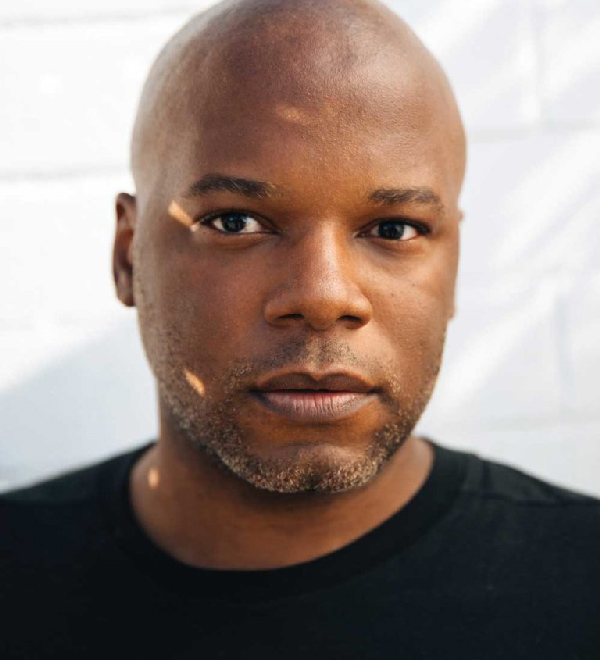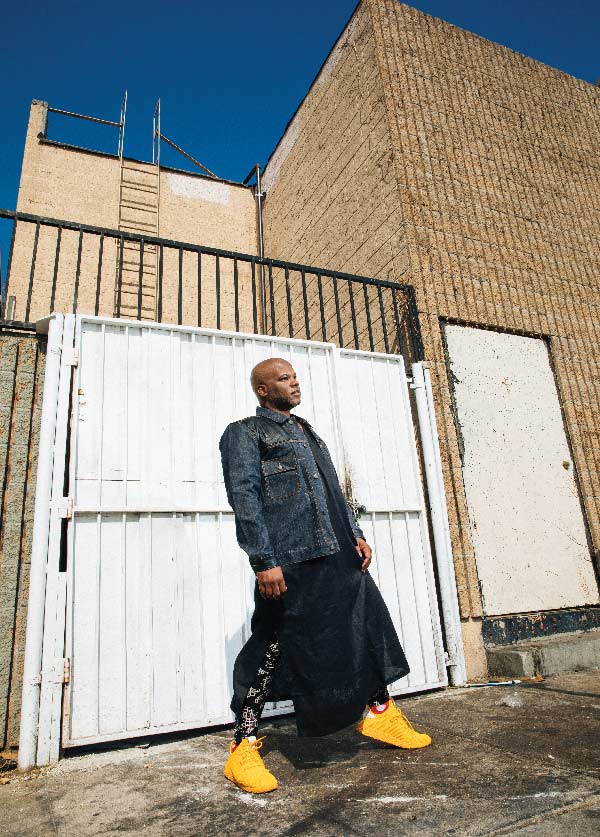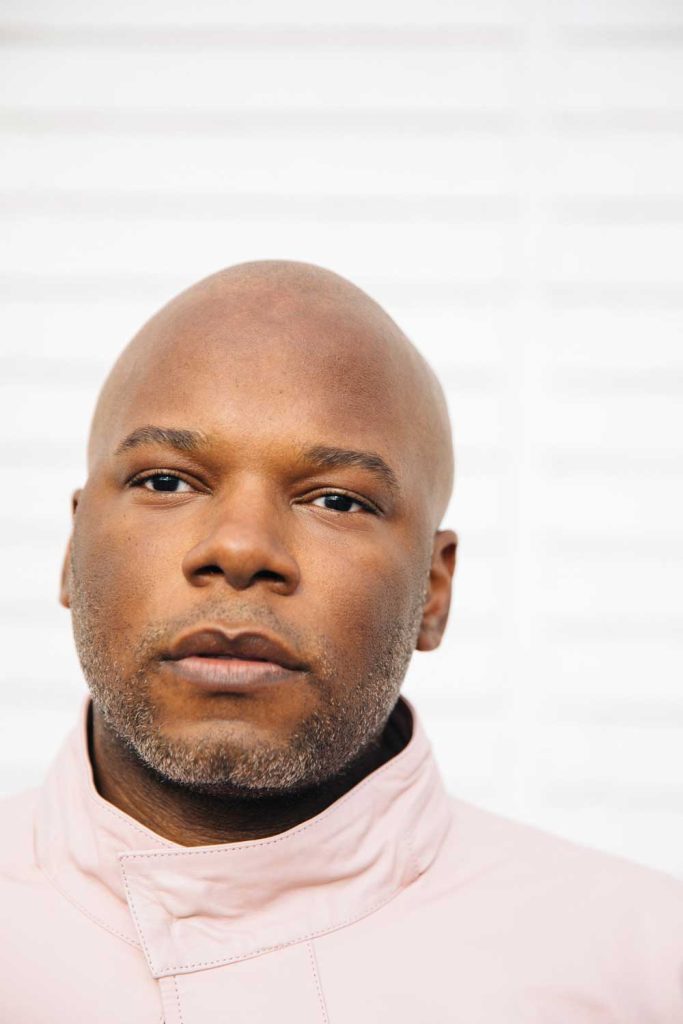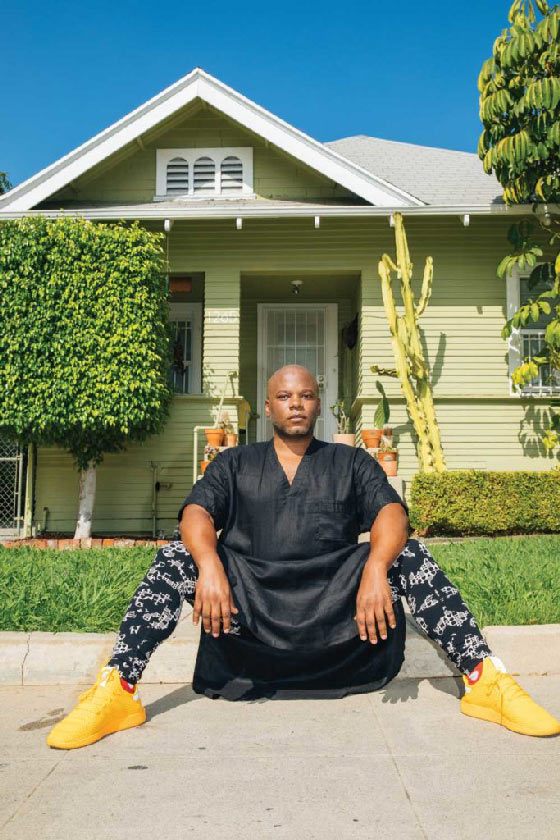~ by joel martens ~

José Eduardo Paulino dos Santos, better known as Coréon Dú is a phenome. His creative streak surfaced when he began writing melodies and music as a tender young child. By the age of 17 he began working in the advertising industry and soon after moving on to fashion agencies. A true multi-tasking genius, at 30 he’s conquered more than his share of creative endeavors, becoming a successful singer, model, agent, record label founder, designer, event organizer, and television producer. So much a modern pioneer, he was recently heralded by Forbes magazine as “One Of The Creatives Rebranding Africa.”
To say that Coréon Dú has a broad range of interests is an understatement: Music, dance, film, television, fashion, advertising, branding and communications, the list goes on. He enlightened us about what drives his passion for so many different arenas. “Fashion and music had kind of always been in my life. My family members have great stories of me tearing down sheets and curtains to try to make outfits for my toys, and I was always singing around the house. As a child, I wanted to be like the characters I saw in movie musicals and my favorite pop performers.”
Art and fashion were a form of escapism for Dú from early on. “I was born practically blind, for which I had several eye surgeries between the time I was a baby and before the age of four. As a result, to retrain my eyes, I had to wear an eye patch and was quite cross-eyed during that time,” he reflected. “Add to that, I had very feminine mannerisms, so of course that meant kids my age made mean comments about me at school and in my moms neighborhood. Even after moving abroad boys always picked on me for that as well,” he recalled.
Reflecting his passion for TV, telenovelas Windeck and Jikulumessu, both produced by Coréon Dú, have been nominated for international Emmys for tackling socially sensitive issues including polygamy, homosexuality, suicide in the LGBTQ community and prostitution caused by human trafficking. Subjects controversial enough to have the latter show banned from African television after two of the main male characters engaged in a same-sex kiss.

Accused of promoting homosexuality in the territory by Angolan media, the show’s cancellation was reversed due to the outcry from its fans, who demanded its return. “I’m indeed quite grateful for the reaction of fans of both of those shows,” shared Dú. “Especially because they proved that at the end of the day, most people are open-minded to creative ideas and stories from various communities when presented thoughtfully and respectfully.”
Founder of the Angola-headquartered Da Banda modeling agency and organizer of the Elite Model Look Angola, Cape Verde, Mozambique and South Africa, Dú scouted Angolan top models: Alécia Morais, Amilna Estêvão, Claudia Marals and Maria Borges, the first African model covering Elle US, as well as Roberta Narciso the first to be endorsed by international brands Valentino and Prada. Dú’s own fashion brand, WéDú, has been featured in Paper Magazine, Neo2 Spain, Elle and Vanity Teen and his fashion documentary Bangalogia, The Science Of Style, explores the mysterious “It factor” called “Banga” in fashion, which inspires so many, in and out of Africa.
Music runs deeply in his bloodline and Dú has been writing melodies from an early age. As he said, “I have a family connection to people with a prominent musical legacy in my country, like my grandfathers cousin Liceu Vieira Dias, who is pretty much considered the father of modern Semba music, the precursor to modern musical styles like kizomba, kuduro and others.”
A gifted musician himself, Coréon Dú has a new album, his fourth, called The Love Experiment, featuring themes surrounding the concept of love. He subtly approaches key subjects very close to his heart, issues many in the queer community can probably identify with, such as self-esteem, hope of a brighter future, sexual fluidity… and of course breakups. “The Love Experiment really is an open discussion about love, what it means to me right now and stories related to love,” explained Dú. “I have songs that celebrate self-love and romance, but I’m not afraid to go into subjects like toxic relationships, which can interfere in the ability to love yourself or anyone else.”

Although it would be impossible to encapsulate his work under one category, there are two main aspects that define Coréon Dú’s essence: his wish to represent the exotic, diverse, and colorful cultural elements of Africa and establish dialogue around the reality of the LGBTQ community on his continent. “One of the biggest challenges I encountered after returning to Angola, was actually having people listen to and respect the voice of a younger person like myself,” he shared. “In African culture there’s a reverence for age and if you’re under 40, you don’t really have a voice, because for the most part an elder would be speaking on your behalf and making choices for you.”
“Most of the first socially-minded projects I started were out of that frustration and with the intention of creating spaces where my peers and I could discuss our points of view,” continued Dú. “I was raised by a feminist and parents who wanted their kids to be intelligent, educated and productive members of society regardless of their biological gender. Creating dialogue and opportunities for people to educate themselves is the best form of activism, which is why in my commercial work, especially as a creative director and a television producer, I’ve tried to integrate opportunities for visibility.”
As to the conversation around LGBTQ rights, it’s even more complex because of societal biases and a history of discrimination. “It really became tiresome to see the LGBTQ community constantly vilified through caricatures and misinformation,” said Dú. “When I realized that a lot of this was done out of a lack of knowledge or maybe even a selective ignorance—I focused on sharing with the public real and positive portrayals of people from the LGBTQ community. Conversations between people with opposing views, but with people who were able to discuss them with human respect for each other.”
Coréon Dú has worked in media and the public eye for over a decade, and because of that he’s discovered a few truths he holds dear. “I’ve come to the conclusion that there is often a difference between what everyday people´s thoughts and attitudes are, those of media influencers, as well as political and religious influencers,” he opined.
“The Jikulumessu ‘incident’ was really proof of that. The ban was politically motivated, through pressures by political and religious figures who alleged my ‘questionable morals’ were trying to corrupt the TV viewing public’s minds with my ‘gay agenda.’ Most of the people who made calls to the station and requested the comeback on social media, were just TV viewers who enjoyed the drama of the writing and had a favorite character in the show.”

“I still believe many people are more tolerant than they’re given credit for, I’ve even seen my work resonate with people in other African countries that are even harsher toward LGBTQ people,” Dú went on to say. “The biggest question mark is the decision makers, because at the end of the day they are the ones with the loudest voices and the biggest platforms. They have a large role in choosing whether their town will be conciliatory or divisive around LGBTQ issues.”
Dú opened up more about what he sees happening in Africa, specifically Angola where he lives. “I’m very happy that the Angolan constitution was updated in 2010. It has laws with language that does not allow people to be discriminated on the basis of ethnicity, gender, sexual orientation, religious or political affiliation. I’m cautiously optimistic around things like that, because I know there’s a very large distinction between acting politically correct and being socially correct,” he pointed out.
“For the most part other than perceived gender, these factors are considered matters of people’s private lives in Angola culturally, and there’s a high respect for people’s right to privacy. Even though Angolan popular music and dances are often very sensual and even provocative, it’s not a common thing for straight couples to hold hands or kiss in public, because that’s considered as part of their intimate private lives. And to some extent, that is how people view LGBTQ relationships, part of their private life and therefore not their business.”
We finished with what it means to Coréon Dú to be named “One of the Creatives Rebranding Africa” by Forbes magazine. “It’s really an honor, because there are 54 countries in Africa with large populations and millions of amazingly talented people. Being recognized for my work within that context is really a pleasure, especially because I’m a part of a linguistic minority that is still really under-represented within the African continent and in general abroad. Seeing my work celebrated beyond the Portuguese-speaking countries and become mainstream in major African markets and celebrated by a publication like Forbes, really motivates me to keep going and growing,” he shared. “Thank you for this opportunity to share my story, my passions and my work.”
Coréon Dú’s fashion line is available at wedufashion.com. To learn more about him, his latest album The Love Experiment and more of his music, check him out on Facebook.com/CoreonDuOficial, Instagram.com/coreondu, Twitter.com/coreondu or his YouTube channel.